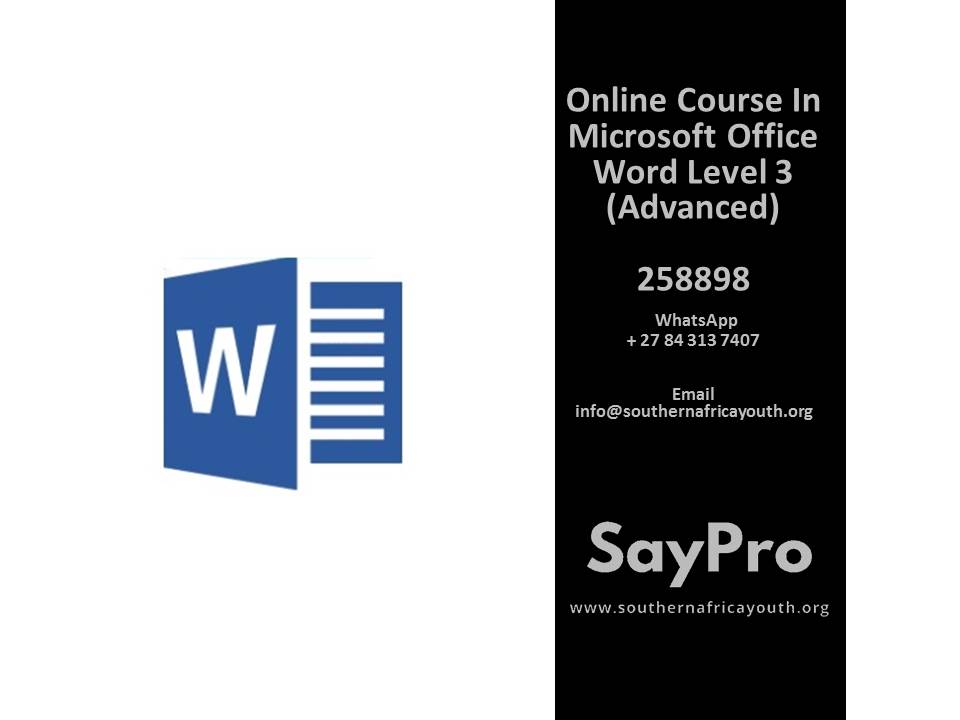SAQA ID: 258877 Demonstrate knowledge of and manipulate expert and subdocuments in a Graphical User Interface -GUI-based word processor – NQF Level 04 Credits 04
PURPOSE OF THE UNIT STANDARDThis Unit Standard is intended for people who need to demonstrate knowledge and apply master and subdocuments, fields, forms, outlines and macros and security settings in word processing documents and applications.A person credited with this unit standard is capable of:Demonstrating an understanding of and use master and sub documents.Using outline options.Creating and use fields.Creating and use forms.Creating and automate tasks using macros.
Author: Mamagohla Patricia Tsebe

SayPro Face to Face Course in Microsoft Office Word Subdocuments 258877

SayPro Face to Face Course in Microsoft Office Word Level 3 Advanced 258898
Microsoft Office Word Level 3 (Advanced)
SAQA ID: 258898Duration:2 DaysProgramme Outcome:- Inserting and deleting sections within a document while maintaining document integrity.
- Inserting, editing, and deleting headers and footers within a document.
- Facilitating online review of documents using comments and tracking changes.
- Creating and using Styles in a document.
- Creating, editing and/or deleting references in a document.
- Creating, editing, and using electronic links in a document.
Accredited SAQA Unit Standard Title: 258898 Review and create documents using a Graphical User Interface (GUI)-based word processor NQF Level 3 Credits 7Accredited: YesTraining Provider: Southern Africa Youth ProjectSETA Accreditation Institution Name: MICT SETAAccreditation Number: Acc/2013-07/3086Training Delivery Mode: Online, Blended, Distance and Face to Face

SayPro Face to Face Course in Microsoft Office Word Level 3 (Intermediate) 116942
SAQA ID: Operate a Windows System NQF Level 04 Credits 06

SayPro Face to Face Course in Microsoft Office Word Level 3 (Advanced) 258898
SAQA ID: Operate a Windows System NQF Level 04 Credits 06

SayPro Face to Face International Leadership Development Programme
SAQA ID: 50081 Operate a Windows System NQF Level 04 Credits 00
PURPOSE AND RATIONALE OF THE QUALIFICATION
Purpose:The purpose of the qualification is to enable qualifying learners to apply leadership competencies to ensure service excellence.
Learners will develop competencies to utilise leadership skills to enhance service delivery in a specific sector or context. Individual learners will benefit through enhancing their personal competencies, knowledge and skills so as to be able to complete tasks required in their employment contracts and by legislation, relating to:
Applying emotional intelligence in a leadership context.
Motivating self and others.
Applying leadership to relationship management.
Applying visionary thinking skills in leadership problem-solving contexts.
Developing service culture of a specific sector.Rationale:
The qualification is aimed at councillors, leaders and municipal managers in local government. The typical learner will be an employee in local government, wishing to gain the competence to fulfill the requirements of his/her current job obligations or a municipal employee or councillor wishing to gain a qualification so as to advance his/her career opportunities. In addition persons seeking future employment in the local government sector may choose to complete this qualification.
Office bearers and employees at local government level are responsible for managing the provision of services to the community. The Constitution of the South Africa (Act 108 of 1996) section 27 (1) states that all South Africans have the right to access health care services; sufficient food and water and social security. Section 27(2) requires the state to take reasonable measures within its available resources to provide these basic human rights. The state is also responsible for providing education for the community and managing all of the country’s resources. The Constitution therefore allows the community to demand that services are met and that government office bearers and managers have the skills to take reasonable measures in providing services.
The Exit Level Outcomes contained in this qualification are based on competencies required for people dealing with integrated development planning in a municipal context. The outcomes have been designed to fall into 8 broad areas of competence which will enable learners to:
Deal with issues and provide strategic leadership at various levels including community.
Build consensus amongst diverse groupings of people with various interests.
Apply innovative, creative and flexible strategies and thinking when dealing with community issues and needs.
Build trust between the councillors, officials, community and various competing interest groups while maintaining personal integrity.
Manage conflict.
Demonstrate the commitment and tenacity to achieve set objectives.
Communicate with conviction, confidence and integrity at all levels and constituencies.The qualification aims to provide opportunities for applied competencies in these areas and provides a basis for further qualifications in municipal and public sector management at higher levels on the NQF.
Learners will build on their existing competencies. The competencies in this qualification will assist learners in their role in organisational leadership and will also provide competencies which are transferable to the any sector.
The Exit Level Outcomes highlight many of the integrated and intergovernmental skills required within any sector. Such skills and knowledge are geared towards enabling councillors, leaders and municipal managers to operate effectively and successfully in a demanding environment. Therefore, the Exit Level Outcomes and related Assessment Criteria highlight competences related to achieving leadership development for any sector.
The FETC: Leadership Development Level 4 should produce knowledgeable, multi-skilled workers who are able to contribute to enhanced service delivery in any sector or context. It should provide the means for current workers to receive recognition of prior learning, to upgrade their skills and achieve a nationally recognised qualification. It will ensure that the quality of education and training in the any sector is enhanced and of a world-class standard.